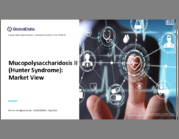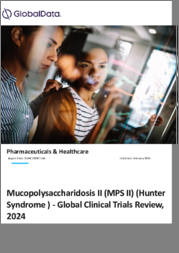
|
시장보고서
상품코드
1568656
헌터증후군 치료 시장 : 기회, 촉진요인, 산업 동향 분석 및 예측(2024-2032년)Hunter Syndrome Treatment Market, Opportunity, Growth Drivers, Industry Trend Analysis and Forecast, 2024-2032 |
||||||
세계 헌터증후군 치료제 시장은 세계 인구 고령화에 힘입어 2024-2032년간 연평균 5.9%의 성장률을 나타낼 것으로 전망됩니다.
유엔 보고서에 따르면, 65세 이상 세계 인구는 2021년 7억 6,100만 명에서 2050년 16억 명으로 급증할 것으로 예상됩니다. 이러한 고령 인구로의 인구학적 변화는 헌터증후군으로 대표되는 노화 관련 질환 및 유전성 질환의 유병률 증가와 상관관계가 있습니다. 노인 인구가 증가함에 따라 이러한 질환에 대한 효과적인 치료법 및 관리 전략에 대한 수요도 증가하고 있습니다. 노인들은 만성질환과 희귀질환에 걸리기 쉽기 때문에 고급 치료 옵션과 지속적인 의료서비스에 대한 요구가 증가하고 있습니다.
헌터증후군을 포함한 희귀질환 연구개발에 대한 투자가 크게 증가하고 있습니다. 이러한 자금 지원의 급증은 미충족 의료 수요에 대한 긴급한 필요성이 널리 인식되고 있다는 것을 입증합니다. 새로운 효소 보충 요법부터 획기적인 유전자 치료까지 선구적인 치료법에 초점을 맞추었습니다. 대형 제약사, 생명공학 기업, 연구기관을 포함한 주요 기업들은 새로운 치료법을 개발할 뿐만 아니라 기존 치료법을 개선하고 진단 기술을 강화하는 데에도 힘을 쏟고 있습니다. 이러한 자금 유입은 과학적 발견을 가속화하고 유망한 치료법을 임상 적용에 더 가까이 다가갈 수 있도록 돕고 있습니다.
헌터증후군 치료 산업은 치료 유형, 최종 용도 및 지역에 따라 제품을 분류합니다.
조혈모세포이식(HSCT) 분야는 2032년까지 급성장할 것으로 예상됩니다. 조혈모세포 이식은 건강한 줄기세포를 도입하여 체내 결손된 효소나 결핍된 효소를 보충하여 대사 기능을 강화하고 질병의 진행을 억제하는 것을 목적으로 합니다. 조혈모세포 이식의 유망성은 임상시험과 실제 임상 적용 양면에서 뒷받침되고 있으며, 장기적인 결과 개선과 환자의 삶의 질 향상으로 이어질 수 있는 가능성을 강조하고 있습니다. 조혈모세포 이식에 대한 관심이 높아지는 것은 조혈모세포 이식에 대한 치료적 가능성을 보여줄 뿐만 아니라, 맞춤형 치료와 표적 치료로 향하는 업계의 광범위한 추세를 반영하여 시장 성장을 더욱 촉진하고 있습니다.
홈케어 분야는 2032년까지 병원 방문 횟수 감소, 맞춤형 치료 계획, 환자의 편안함과 행복에 도움이 되는 환경 등의 장점으로 인해 견인력을 높일 것으로 예상됩니다. 효소 보충 요법, 일상적인 모니터링, 증상 관리 등을 익숙한 환경에서 원활하게 수행할 수 있어 스트레스를 최소화할 수 있습니다. 재택의료의 부상은 원격의료의 발전, 휴대용 의료기기의 등장, 환자 중심 진료에 대한 종합적인 관심에 힘입은 바 큽니다.
유럽의 헌터증후군 치료 산업은 2032년까지 탄탄한 성장세를 이어갈 것으로 예상되며, 그 배경에는 의학 연구의 발전, 의료비 증가, 희귀질환에 대한 인식 증가가 있습니다. 유럽 국가들은 조혈모세포 이식, 정교한 홈케어 솔루션 등 전위적인 치료법을 선도적으로 도입하고 있습니다. 유럽의 상황은 헌터증후군 환자의 치료 결과를 개선하기 위한 탄탄한 의료 인프라, 규제 프레임워크 및 공동 연구 이니셔티브를 통해 더욱 풍요로워지고 있습니다.
목차
제1장 조사 방법과 범위
제2장 주요 요약
제3장 업계 인사이트
- 업계 생태계 분석
- 업계 영향요인
- 성장 촉진요인
- 업계의 잠재적 리스크&과제
- 성장 가능성 분석
- 브랜드 분석
- 향후 시장 동향
- 가격 분석
- 약사 규제
- 제품 파이프라인 분석
- 현재 치료법
- 역학 시나리오
- 상환 시나리오
- Porter's Five Forces 분석
- GAP 분석
- PESTEL 분석
제4장 경쟁 환경
- 서론
- 기업 점유율 분석
- 기업 매트릭스 분석
- 경쟁 포지셔닝 매트릭스
- 전략 대시보드
제5장 시장 추정·예측 : 치료 유형별, 2021년-2032년
- 주요 동향
- 효소 보충 요법(ERT)
- 조혈모 세포 이식(HSCT)
제6장 시장 추정·예측 : 용도별 : 2021년-2032년
- 주요 동향
- 병원
- 진료소
- 홈케어 환경
제7장 시장 추정·예측 : 지역별, 2021년-2032년
- 주요 동향
- 북미
- 미국
- 캐나다
- 유럽
- 독일
- 영국
- 프랑스
- 스페인
- 이탈리아
- 네덜란드
- 기타 유럽
- 아시아태평양
- 중국
- 일본
- 인도
- 호주
- 한국
- 기타 아시아태평양
- 라틴아메리카
- 브라질
- 멕시코
- 아르헨티나
- 기타 라틴아메리카
- 중동 및 아프리카
- 남아프리카공화국
- 사우디아라비아
- 아랍에미리트(UAE)
- 기타 중동 및 아프리카
제8장 기업 개요
- Astellas Pharma Inc.
- B.Braun
- Baxter International
- CHIESI Farmaceutici S.p.A.
- Fresenius Kabi
- GC Pharma
- JCR Pharmaceuticals
- Takeda Pharmaceutical Company Limited
- Terumo Corporation
- Thermo Fisher Scientific
The Global Hunter Syndrome Treatment Market is projected to expand at a CAGR of 5.9% during 2024-2032, fueled by an aging global population. The United Nations reports that Global population aged 65 and older is set to surge from 761 million in 2021 to a staggering 1.6 billion by 2050. This demographic shift toward an older populace correlates with a rising prevalence of age-related and genetic disorders, notably Hunter Syndrome. As the elderly population grows, so does the demand for effective treatments and management strategies for such conditions. Given their heightened susceptibility to chronic and rare diseases, there's an amplified need for advanced therapeutic options and continuous medical care.
Investment in R and D for rare diseases, including Hunter Syndrome, is witnessing a significant uptick. This surge in funding underscores a broader recognition of the urgent need to address unmet medical requirements. The focus is on pioneering treatments, spanning from novel enzyme replacement therapies to groundbreaking gene therapies. Key players, including pharmaceutical giants, biotech firms, and research institutions, are not only delving into new treatment avenues but are also refining existing therapies and bolstering diagnostic techniques. This financial influx is accelerating scientific discoveries and propelling promising treatments closer to clinical application.
The Hunter Syndrome Treatment Industry categorizes its offerings based on treatment type, end-use, and geographical region.
The hematopoietic stem cell transplant (HSCT) segment is poised for rapid growth through 2032. By introducing healthy stem cells to replace the body's defective or missing enzymes, HSCT aims to enhance metabolic function and curb disease progression. Both clinical trials and real-world applications underscore HSCT's promise, spotlighting its potential for bolstered long-term outcomes and an enriched quality of life for patients. The rising inclination towards HSCT not only signifies its therapeutic promise but also mirrors a broader industry trend leaning towards personalized and targeted therapies, further propelling market growth.
The homecare segment is set to gain traction through 2032, owing to advantages like fewer hospital visits, tailored care plans, and an environment conducive to patient comfort and well-being. Enzyme replacement therapies, routine monitoring, and symptom management can be seamlessly administered in this familiar setting, minimizing stress. The ascent of homecare is largely attributed to strides in telemedicine, the advent of portable medical devices, and an overarching focus on patient-centric care.
Europe Hunter Syndrome treatment industry is poised to witness a robust growth trajectory through 2032, attributed to strides in medical research, bolstered healthcare expenditures, and heightened awareness surrounding rare diseases. European nations are leading the charge in embracing avant-garde treatment modalities, prominently featuring Hematopoietic Stem Cell Transplants and sophisticated homecare solutions. The European landscape is further enriched by its robust healthcare infrastructure, a conducive regulatory framework, and collaborative research initiatives, all aimed at elevating treatment outcomes for Hunter Syndrome patients.
Table of Contents
Chapter 1 Methodology and Scope
- 1.1 Market scope and definitions
- 1.2 Research design
- 1.2.1 Research approach
- 1.2.2 Data collection methods
- 1.3 Base estimates and calculations
- 1.3.1 Base year calculation
- 1.3.2 Key trends for market estimation
- 1.4 Forecast model
- 1.5 Primary research and validation
- 1.5.1 Primary sources
- 1.5.2 Data mining sources
Chapter 2 Executive Summary
- 2.1 Industry 360° synopsis
Chapter 3 Industry Insights
- 3.1 Industry ecosystem analysis
- 3.2 Industry impact forces
- 3.2.1 Growth drivers
- 3.2.1.1 Increasing prevalence of Hunter syndrome
- 3.2.1.2 Advancements in treatment options
- 3.2.1.3 Rising R and D expenditure
- 3.2.2 Industry pitfalls and challenges
- 3.2.2.1 High cost of treatment
- 3.2.2.2 Limited awareness and diagnosis
- 3.2.1 Growth drivers
- 3.3 Growth potential analysis
- 3.4 Brand analysis
- 3.5 Future market trends
- 3.6 Pricing analysis
- 3.7 Regulatory landscape
- 3.8 Product pipeline analysis
- 3.9 Current therapies
- 3.10 Epidemiology scenario
- 3.11 Reimbursement scenario
- 3.12 Porter's analysis
- 3.13 GAP analysis
- 3.14 PESTEL analysis
Chapter 4 Competitive Landscape, 2023
- 4.1 Introduction
- 4.2 Company market share analysis
- 4.3 Company matrix analysis
- 4.4 Competitive positioning matrix
- 4.5 Strategy dashboard
Chapter 5 Market Estimates and Forecast, By Treatment Type, 2021 - 2032 ($ Mn)
- 5.1 Key trends
- 5.2 Enzyme replacement therapy (ERT)
- 5.3 Hematopoietic stem cell transplant (HSCT)
Chapter 6 Market Estimates and Forecast, By End-use, 2021 - 2032 ($ Mn)
- 6.1 Key trends
- 6.2 Hospitals
- 6.3 Clinics
- 6.4 Homecare settings
Chapter 7 Market Estimates and Forecast, By Region, 2021 - 2032 ($ Mn)
- 7.1 Key trends
- 7.2 North America
- 7.2.1 U.S.
- 7.2.2 Canada
- 7.3 Europe
- 7.3.1 Germany
- 7.3.2 UK
- 7.3.3 France
- 7.3.4 Spain
- 7.3.5 Italy
- 7.3.6 Netherlands
- 7.3.7 Rest of Europe
- 7.4 Asia Pacific
- 7.4.1 China
- 7.4.2 Japan
- 7.4.3 India
- 7.4.4 Australia
- 7.4.5 South Korea
- 7.4.6 Rest of Asia Pacific
- 7.5 Latin America
- 7.5.1 Brazil
- 7.5.2 Mexico
- 7.5.3 Argentina
- 7.5.4 Rest of Latin America
- 7.6 Middle East and Africa
- 7.6.1 South Africa
- 7.6.2 Saudi Arabia
- 7.6.3 UAE
- 7.6.4 Rest of Middle East and Africa
Chapter 8 Company Profiles
- 8.1 Astellas Pharma Inc.
- 8.2 B.Braun
- 8.3 Baxter International
- 8.4 CHIESI Farmaceutici S.p.A.
- 8.5 Fresenius Kabi
- 8.6 GC Pharma
- 8.7 JCR Pharmaceuticals
- 8.8 Takeda Pharmaceutical Company Limited
- 8.9 Terumo Corporation
- 8.10 Thermo Fisher Scientific















